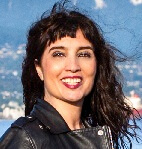A woman moves her hand in a delicate arabesque, as a Spanish guitar plays distinctive chords that can only be flamenco. A husky voiced alto sings heartfelt, serpentine melodies that express the very soul of Andalucía.
Where is this, you might ask? A church in Granada perhaps? A café in Seville? No, actually, it’s the opening night of the 25th Anniversary of the Vancouver International Flamenco Festival at the Playhouse Theatre. The legendary Andres Pena and Pilar Ogalla Company has come all the way from Spain to lend the Pacific city some duende.
Duende is that indefinable, spiritual essence that enters into one’s being and comes out as impassioned dance, a flurry of fingers or a deep cante jondo. In his Theory and Play of the Duende, Garcia Lorca (whose right-wing, civil war-era assassins and burial place were recently revealed — a fitting time to invoke his spirit) explains,
“The duende works on the dancer’s body like wind on sand. It changes a girl, by magic power, into a lunar paralytic, or covers the cheeks of a broken old man, begging for alms in the wine-shops, with adolescent blushes: gives a woman’s hair the odour of a midnight sea-port: and at every instant works the arms with gestures that are the mothers of the dances of all the ages.”
Lorca speaks of the duende as “A mysterious force that everyone feels and no philosopher has explained.”
Our civic malaise
As the rainy season begins in a city the Economistrecently called “mind-numbingly boring”, I could use a little duende – and God knows Vancouver could. Like Garcia Lorca, the apparent soullessness of this city often has me asking, The duende… Where is the duende? Through the empty archway a wind of the spirit enters… in search of new landscapes and unknown accents: a wind with the odour of a child’s saliva, crushed grass, and Medusa’s veil, announcing the endless baptism of freshly created things.
I pondered this as the impassioned performance gave way to another bland, rainy night where everything shuts down early, as if narcolepsy were our civic malaise.
The spirit of flamenco was born after all from the unique fusion of cultures in Andalucía: gypsy, Jewish, Muslim, Christian traditions blended together harmoniously under Moorish rule, creating a unique musical, linguistic and architectural style and a society where scientists, poets and dancers set standards still admired centuries later.
While Vancouver sounds good on paper and would seem to have all the right ingredients to create our own unique brand of duende — city by the sea, warmest place in Canada, huge Iranian, Chinese and Indian diasporas, rich First Nations tradition — in reality it’s one of the most racially segregated cities in North America.
With a few notable exceptions – like say the two block stretch West of Davie on Denman that boasts the Iraqi Babylon Café next to a Persian kebab shop with a killer view of English Bay and palm trees that make it possible to pretend for a moment you’ve been transported to Beirut, or say, the area around 15th and Lonsdale in North Vancouver where the Yaas Café sells saffron rice across from Loblaws and newly arrived Iranians mingle with blond descendants of Glaswegians who arrived post-war to work in the shipyards — much of Vancouver consists of ethnic solitudes.
Cliquey enclaves
While planners blame this on the suburban legacy of the CPR railway subdivisions that shaped the city, I think it has a lot to do with our colonial heritage. In a weird way, my birth city reminds me of Nairobi in the 30’s – cliquey enclaves that never rub shoulders, and ghettoized suburbs where multiculturalism is more about criminal gangs than folk dancing (see Deepa Mehta’s Surrey inspired Beeba Boys).
While Toronto has atoned for its Presbyterian past with lively, multi-lingual neighbourhoods like King Street West, that make it one of the most multicultural cities in the world (according to the UN) and Montreal has always been, well, Montreal, Canada’s third largest city seems increasingly to be channeling silo culture.
Long before the damning description by the Economist, the Vancouver Foundation’s 2012 study showed that a sense of isolation was one of Vancouverites biggest complaints. Some of this mono-cultural, isolationist tendency can be blamed on the high cost of housing, but it’s deeper than that.
Social apartheid
Oddly for a city whose arts scene champions cultural mélange (the flamenco festival, for example, was founded by Mexican-Lebanese dancer Rosario Ancer whose company features Japanese-Canadian performer Nanako Aramaki; the Vancouver International Film Festival offers impressive programs of Iranian and South African cinema, UBC’s Chan Centre is presenting the Buena Vista Social Club and Youssou N’Dour) Vancouver maintains a de facto social apartheid.
Audiences for “world music” festivals remain predominantly white; Iranian virtuosos play to mainly Farsi speaking crowds on the North Shore, and Asian film stars come to town, virtually unnoticed by half the city.
I haven’t given up on my birth city entirely. After all there’s so much potential here and perhaps it’s only a matter of time and critical cultural mass before it awakens from its silo-like sleepiness and embraces the genuine and organic cultural exchange that makes for truly “world-class” cities.
In the meantime, you can find me on that stretch of Denman Street, drinking Turkish coffee at the Babylon Café, and desperately chanting flamenco incantations in the hope that a little more duende will come to town.
Hadani Ditmars is the author of Dancing in the No Fly Zone and is working on a new book about ancient sites in Iraq. She has been reporting from the Middle East for two decades and is also a singer and musician.





